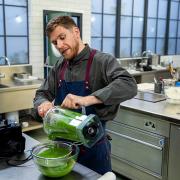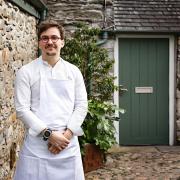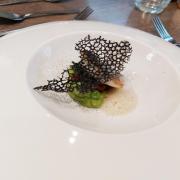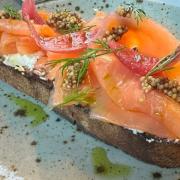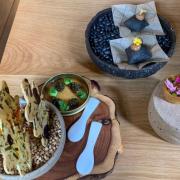Bolton's Anjali Pathak is part of Indian food dynasty, Patak's. She tells Emma Mayoh about how her family managed to curry favour into British culture PHOTOGRAPHY BY KIRSTY THOMPSON
As a girl Anjali Pathak was easily pleased. If mum Meena allowed her to do her homework in the kitchen of their Bolton home she was over the moon.
‘It was a treat,’ said Anjali, a member of the family that founded Indian food dynasty Patak’s 54 years ago. ‘Otherwise I would have to do my homework in my bedroom which I never liked. I always wanted to be in the middle of it all in the kitchen.
‘The Gujurati food my mum and grandma cooked together was incredible too and I learned from them. There were about 15 of us living in the house so meal times were busy. My dad was away a lot on business so he was really keen on us having meals together when we could. He would be eating and making tasting notes and his favourite phrase to my mum was “how do you get that in a jar Meena?”.
‘My mum was always on test, particularly with my grandfather when she was the new daughter-in-law. She is fiery though and coped very well. Where we worked in the business was also decided at the dinner table. If I’d done well in maths, then dad would have me working in the THOMPSONoffice on accounts the next day. I’d dread him asking how things were at school for that reason. I didn’t start officially working for Patak’s until I was 22 though.’
You won’t find Anjali grappling with numbers any more though. And she is still at her happiest in the kitchen as brand ambassador for the company her grandfather, Lakshmishanker, established. She spends her time hosting cookery classes, developing recipes that suit the pastes, sauces and chutneys which came from the family’s cookery books and travelling around the world promoting Patak’s.
The 30-year-old’s passion for Patak’s is obvious. But it is hardly surprising when you consider the sacrifices her family have made and the hurdles they have overcome together.
Lakshmishankar Pathak came from a family of poor farmers. They emigrated from India to Kenya and ran a shop selling Indian sweets to Indian immigrants who craved a taste of home. But as Kenya moved towards independence he and his wife, Shantagaury, set sail for Britain.
The cost of the journey had used up all of his money apart from the �5 left in his pocket.
Anjali said: ‘My grandfather, with little knowledge of English, convinced a bank manager to lend him money to rent a house. He spent weeks looking for a job so my grandmother stepped in.
‘She sold jewellery as well as making sweets and snacks on the family stove. Before long the queues were just as long as they had been at the shop in Kenya.’
The business continued to grow and they opened an Indian food and grocery store in London. In 1984, the business moved from London to Haydock, before settling in Abram, near Leigh in 2000, where the factory is still based. The company supply to dozens of countries around the world and Patak’s are a household name responsible for introducing Indian cuisine to Britain kitchens.
Many members of the family have been involved in the business but it was Anjali’s father, Kirit, who took the reins from his father. In 2007 the Pathaks decided to sell the business to Associated British Foods, the company behind brands like Silver Spoon Sugar. Anjali and her father Kirit who is company chairman, are the only two members still involved. Anjali and her mum Meena wrote a cookery book together to mark the occasion.
The decision to sell came just a few years after the family were involved in a high profile family feud over inheritance of the business which landed in the High Court. A settlement was made with Kirit Patak’s sisters Chitralekha Mehta and Anila Shastri, who claimed they had been cheated of a share in the business.
It is a time Anjali remembers with great sadness but her feelings on it are strong.
‘It was really, really hard,’ said the 30-year-old, who splits her time between Bolton, the factory in Abram and London. ‘It would be hard for any family to go through. But it was particularly difficult for my dad and my grandma. They were his sisters and my grandma’s children.
‘They were trying to tarnish the name that had put food on their plate when they were growing up. I don’t think they really saw past what they were doing, to see that they were harming the thing they believed they were fighting so hard to protect. I know they’ll have their side of the story too but from my perspective, bottom line, you don’t sue your mum. She put you on this earth, what they did to her was wrong.’
But Anjali, who recently graduated from Leith’s School of Food and Wine, is focused on the future. It is clear she relishes the opportunity she has to spread the word of the company that her grandparents worked so hard to establish.
She said: ‘I feel very proud to be a part of the company my family started. When I think about where my grandfather first began and where we are now, I find it incredible. I am just so very, very proud.’
Patak’s facts
You may have noticed a difference in the family name Pathak and the brand Patak’s. The h was dropped in 1962 to make the name easier to pronounce.
It is difficult to believe but Indian families travelling back home from the UK used to smuggle some of the family’s best sauces and pickles back with them. It was at a time the brand was not as readily available in India so several jars would be stuffed into suitcases.
Lakshmishankar Pathak was originally from Indian state, Gujurat. His family moved to Kenya in search of a better life following the death of his father. It was in Kenya they started selling Indian sweets to felow immigrants before they set sail for Britain in 1956.
The now famous Patak’s pickles all came about because of a mistake. Too many vegetables had been ordered for the shop in London so Lakshmishankar decided to pickle the extras. He then started to preserve spices in oil which creates the pastes that are still produced today.
The business may have started with a small team but now it employs more than 700 people worldwide. It all started with Anjali’s grandfather who had just a �5 note in his pocket when he arrived in England.
Some recipes from Pathaks
www.youtube.com/PataksCurryClub
Anjali Pathak, Philippa James and Jonny Nelson from Lancashire One make a Moroccan chicken tagine
Picture and video by Lancashire One
For more food videos from Philippa vist Tigger's Kitchen at Lancashire One - here





